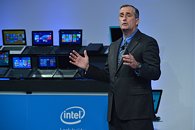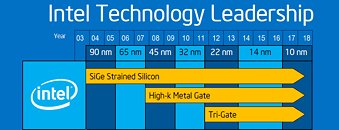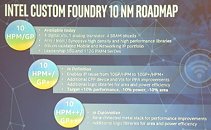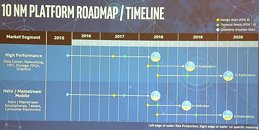Monday, October 30th 2017

Intel 10 nm CPUs to See Very Limited Initial Launch in 2017
UPDATE: Some slides have surfaced today on Reddit that actually place Intel's updated 10 nm roadmap as starting initial risk production in 2Q 2018. The same leaks also point towards a yearly advancement in process technology (akin to Intel's current 14 nm+ and 14 nm++ production processes), with 10 nm+ risk production on 1Q 2019 and 10 nm++ on 1Q 2020. This roadmap, however, is relative to Intel's Custom Foundry partners; as such, this doesn't go directly against Intel CEO's Brian Kzarnich remarks on the latest investor call, since he was likely talking about the 10 nm ramp-up on Intel's own products.
Intel CEO Brian Krzanich has come out to say that the company's first 10 nm CPUs based on the "Cannon Lake" micro-architecture will see the light of day before this year's end. Intel has been having a slew of ramp-up delays with its 10 nm products, which prompted a slippage from an expected 2016, full-scale launch (whose ship has sailed, clearly) towards a timed, product-tier based strategy. Intel opted to first introduce 10 nm technology to FPGA accelerators, which due to their redundancy, would suffer less from yield issues.Intel are "on track to ship our first low-volume 10-nanometer part by the end of the year," Intel CEO Brian Krzanich said in the latest investor call. "That will be followed by the initial ramp in the first half of 2018, with both high volume and system availability in the second half of 2018."
Source:
Liliputing
Intel CEO Brian Krzanich has come out to say that the company's first 10 nm CPUs based on the "Cannon Lake" micro-architecture will see the light of day before this year's end. Intel has been having a slew of ramp-up delays with its 10 nm products, which prompted a slippage from an expected 2016, full-scale launch (whose ship has sailed, clearly) towards a timed, product-tier based strategy. Intel opted to first introduce 10 nm technology to FPGA accelerators, which due to their redundancy, would suffer less from yield issues.Intel are "on track to ship our first low-volume 10-nanometer part by the end of the year," Intel CEO Brian Krzanich said in the latest investor call. "That will be followed by the initial ramp in the first half of 2018, with both high volume and system availability in the second half of 2018."




39 Comments on Intel 10 nm CPUs to See Very Limited Initial Launch in 2017
www.asus.com/Laptops/ROG-Strix-GL702ZC/specifications/
7700K 4.5GHz 91W is a desktop part
7700HQ 3.8GHz 45W is a mobile part
It's like saying a tablet in't mobile because it has a Full blown i7
BTW. If a CPU doesn't have MOBILE written on the box doesn't mean it can't be used in a mobile market and do good. Higher DTP but also more power.
But hey let's get stuck at this meaningless semantic BS , it sure is constructive.
Click one of the U/Y processors, and look at vertical segment: mobile. The others say desktop.
That said, nobody said it's suitable for a Ultra book or very mobile laptop, but it's easily suitable for desktop replacement or normal laptops. Who is using laptops on high performance without charging it anyway? You maybe do that, but not for many hours. And if you charge it, it can even run on high clocks, doesn't matter too much then. But there's no 1800X anyway (in the mentioned one), it's a R7 1700, those have 65W TDP compared to 95W of the former.
Does Intel even have a 8 core on 65W TDP? The answer is no. Intel simply isn't able to pull that off, hence a waste of time comparing Ryzen with 7th gen stuff or higher from Intel.
R7 1700 is nowhere near 65W processors in real life. AMD is claiming 65W TDP but their marketing has been known to be misleading since launch. R7 1700 is 65W, 6900K is 140W. In OCCT there's 20W between them, now look which company has a more honest approach. Ryzens don't have better efficiency than Intel's Skylake/Kablylake, at that comes from lower clockspeed. Look at 1300X at 3.5GHz pulling 10W more than 7600K at 3.8GHz.
Seriously, did you really believe AMD when they said they have a 65W 8c/16t chip to compete with Intel's 140W stuff :laugh:
The 1700 doesn't even use that much in TOTAL SYSTEM power draw when encoding or other media duties.
Even prime95 small FFTs results in 82 watts (which is of course not a realistic work load). The 1700 uses less power than the 7700K.
Go cuddle mommy, but even she doesn't love you.
www.guru3d.com/articles_pages/amd_ryzen_7_1700_review,7.html
I suggest you do that too.